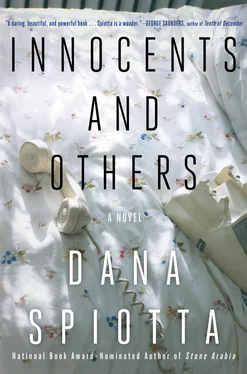I don’t know why I did that. Well, I do know why. But god, I wish I never did that. You can never forget that you are this person ever again. And it is you, so you know I can see how someone becomes that kind of person. A bad person. It isn’t hard to be that. It should be fucking harder.
He stops talking and looks at the ground.
TIME STAMP: 6:58
Deke is leaning back on the couch and staring straight ahead and almost dozing. His hair is disheveled. His t-shirt is off. He is drinking out of a mug. He starts to hum. It is almost a monotone hum like static on a TV, but then he starts to smile and it turns melodic. Finally he smiles widely and begins to sing a song. He sings a few lines and then stops. He eyes the camera and then shrugs and looks away. He yawns and stretches.
DEKE
Okay. It’s morning.
MEADOW
Another bathroom break?
DEKE
I am going to eat some eggs and go to sleep.
MEADOW
So we are done?
DEKE
Yes, we are done.
Meadow turns around and we see her face for the first time as she turns off the camera. The spinning numbers of the time stamp remain as the screen goes black, then the video stops.
It was brutal to watch Deke’s raw footage. Meadow knew there were a lot of ways to proceed. She could do as she planned and cut the pieces together and make it an eight-hour installation piece of real time, a long day’s journey into night. She could cut off the beginning and just make a two-hour film of the meaty pay dirt at the end. She could edit until it showed a ninety-minute highlight reel of his undoing. She could cut out all her questions, so it read like a monologue confession, which would make him seem even more unhinged. She could do many things. She could even record Deke on voice-over commenting on what he was doing in the film the way Jean Rouch did in his anthrographic films. But instead she did a variation on Rouch. She did what the Maysles brothers did to Mick Jagger in Gimme Shelter. She filmed sober Deke looking at rushes of what they had filmed on the video editing monitor. She filmed him looking at himself break down and confess to beating up this person. He pressed rewind and carefully watched it again. She queried him from behind the camera.
“What do you think?” she asked.
“I am very drunk,” he said.
“Yeah,” she said. She zoomed into Deke’s face as he watched Deke on the TV. He lights a cigarette, and we hear him crying on camera. He watches as the video keeps going and he is calmly sitting on the couch. The video goes to static. He stares at the monitor.
“I love it,” he said.
“Really?”
“Yeah. But you should edit it. No one will watch an eight-hour film.”
“So.”
“We want people to watch it. You do, Meadow.”
This was how the film ended, with Deke talking about editing the film. Portrait of Deke , the first of Meadow’s films to go out into the world. She had the video transferred to film and, through connections Carrie had made at NYU, she entered it in three documentary festivals. It won a jury prize, and it received glowing reviews in small but significant places. She was now a real filmmaker.
Deke went along to some of the screenings. And although there was no sudden break, no breakup, Meadow traveled a lot and they eventually, gradually stopped sleeping with each other. By the end of 1988, Deke moved in with new friends in the East Village to try acting or some kind of performance work. Although Meadow was often down in New York and staying at Carrie’s only minutes away, Meadow rarely saw Deke. They were no longer lovers and they were no longer friends either.
There were other changes — consequences — that came out of making Portrait of Deke :
1) Meadow used her video camera. She liked that it was just her on her own. No sound person and natural light. Later she would get a pro Mini DV camera and she could carry it in her shoulder bag.
2) She understood that there is the film, the idea of it, before you make it. Then there is the film during the making of it, the filming and then the editing. But even when the film is done, it still changes. There is the film right after you have finished, then the film after you have shown it for months, and then there is the film after a year, or five years. Each time it feels different to her. Each time it is different to her. But why would this surprise her? When she watched Barry Lyndon at seventeen it was terrible. But at nineteen it was beautiful. That is the thing about films. They don’t change. You change. The immutability of the film (or a book or a painting or a piece of music) is something to measure yourself against. That is one of the things a great work of art does. It stays there waiting for you to come back to it, and it shows you who you are now, each time a little different. But when it is your own film, it isn’t immutable. It feels part of you, and so seems to change with you. The filming, the editing, the showing: all of it looks different to her.
At the very first screening in front of an audience, Meadow almost had to leave. It was strange to see herself there in the film. Talking and exposing a personal element of her life. Who loved her and whom she loved. What she did to him in the film, or let him do to himself. Her goading and her relentlessness and the insistence on an all-night shoot. It was a kind of ambush, no matter how consensual, no matter how willing. It unsettled her to see it there. She realized that Deke was confessing to a crime that could have actual consequences for him. It never occurred to her until that moment. And that you can’t trust people to know their own interests, because even with the film right in front of them, they can’t see themselves. But why shouldn’t she believe him when he says he loves it? (Then there was the fact that they ended things between them with the film, even if it wasn’t obvious at the time. Years later she would see that very few relationships of any kind could survive the intensity and complication and power differential of filming a person as themselves.)
3) Most of the reviewers and juries remarked on the power of the film, the truth of it, the raw emotion.
4) She was very good at this kind of filmmaking and she liked doing it.
5) Nonactors — the unrehearsed, revealed, willing subject—captivated her. If this entailed a certain amount of distress, so be it. Something is there, but filming it, the act, transforms it somehow. The raw human drama — that’s what she wanted. She found the complex inquiry of documentary — not making up the narrative, but discovering it as you went along — was more exciting to her than filming actors in a fictional narrative. Or filming trains.
A few years after Jelly and Oz broke up, Jelly came home from the call center and saw that she had a message. One of her friends from college, Lizzie, had moved to Los Angeles to become an actress. She called Jelly once every couple of weeks, and they would talk for an hour or so. It was Jelly’s big indulgence. Lizzie didn’t work much as an actress, and she worked part-time as a housecleaner. She was always broke, so Jelly called Lizzie back and the call would go to Jelly’s bill.
When Jelly called, Lizzie was very excited.
“Guess what?” Lizzie said.
“What?”
“I was cleaning this gorgeous — I mean unbelievable — house on Mulholland. Me and three other girls.”
“Marlon Brando’s house?” Jelly said.
“No, nobody’s house, but listen.”
“What?” Jelly was washing dishes as she spoke, gripping the phone between shoulder and ear. She ran the water low so she could hear.
Читать дальше












